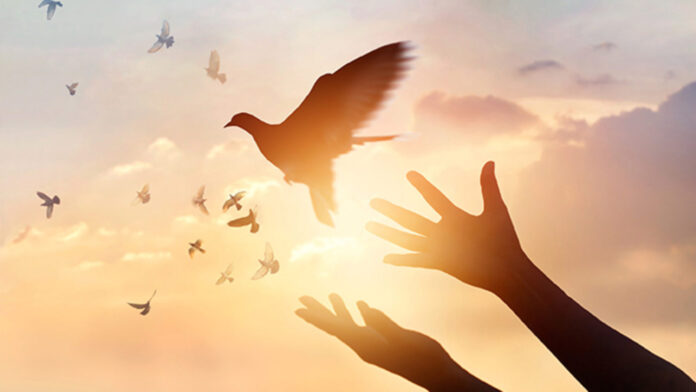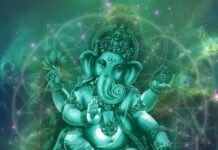Hurt, guilt, anger and vengeance all of which, if sustained for a long time turn toxic in every which way. There’s one word which takes care of it all – Forgiveness
By Pragati Oswal
We are living in a “coronized” world! A world where a “lockdown” is probably one of the best ways to prevent, check as well as contain the COVID spread. While most of us are experiencing the limitations that the lockdown has imposed upon us, it is worth our while to ponder over things that actually limit us, lock us down within.
I am talking about our emotional (b)locks. Hurt, guilt, anger and vengeance all of which, if sustained for a long time turn toxic in every which way. There’s one word which takes care of it all – Forgiveness!
First and foremost, we need to ask ourselves a very pertinent question!Why is it that more often than not, we find ourselves holding onto resentment, grudges, guilt, vengeance and animosity? Why do we continue to recycle unpleasant circumstances in our minds and keep the wounds festering under the scar? Some of you might look upon it as a protective mechanism. If a past situation or a person has hurt us, our mind likes to replay the action over and over, keeping the memory and feelings alive to warn us, to keep us on our guard so as to prevent the manifestation of a similar situation. While we seem to think that we are shielding ourselves, aren’t we actually keeping those wounds alive? Aren’t we holding onto pain ever more tightly to guard our self against pain? Can you see the strange contradiction? Countering a heart full of pain with a mind full of vengeance, is like distracting oneself from a prick with a slap!
Is it so easy to forgive one might ask! Especially when one hasn’t been at fault or has been on the receiving end of some unkind treatment, it’s not always easy to just let go and move on! What about justice? Why should another be let off the hook for being so awful? What if another doesn’t even register the wrong that has been done?
It is an ideal situation when things can be sorted out peacefully and the parties hear each other out patiently, assess impartially and come to an understanding so that no grudge or bitterness remains. The end result isn’t a culmination of a close bond between the conflicting parties or replacement of enmity with close friendship. It’s just a neutralization of negative stimuli. Anger, hurt and vengeance are mostly consequences of a feeling of being wronged in some way. In this sense the wrong doer has incited negative emotions into one’s psyche. Returning the wrong with forgiveness instead of vengeance, only means that one is releasing the wrong-doer from any power to influence one’s feelings or energy.
Let’s look at the other side of the coin now! There are times one has hurt someone knowingly and realizes the wrong committed by the self. Many times, even if one seeks forgiveness, the wronged side holds on to the hurt too strongly and cannot open up to forgiving at all. At other times, one cannot avail the option to apologize, irreversible damage has been done! In this scenario, penitence cannot be registered by anyone except oneself, there is no external atonement. The result is guilt. Guilt is a dangerous emotion. It feeds on punishment. Let’s not confuse guilt with compunction. The latter makes us check our actions. Long seated guilt constantly looks for incessant punishment to free itself from its own clutches. Forgiving oneself, acknowledging one’s own fault as well as the genuinity of the feeling of one’s regret, is the only way out of the self-inflicted jail of sorrow!
In this sense forgiveness is freedom. Freedom from the clutches of anger, hurt, animosity, vengeance and guilt! This freedom is the doorway to happiness.
However, most of us find it difficult to forgive others, seek forgiveness and forgive ourselves. Michhami Dukkadam is a beautiful annual tradition from the philosophy of Jainism. It means, may all evil, all wrongs be forgiven!Once a year comes a day when one seeks forgiveness from each and every person who one might have hurt knowingly or unknowingly through thought, word or action.
It is an annual reminder to find humility within oneself, to humble oneself so that one can attain freedom from the negatives of guilt and grudge.By seeking forgiveness, not only does one heal the self, one also attempts to heal the pain in those one has hurt. This reminder is important precisely because one tends to forget to forgive or even forgets that somethings were forgiven.
Renowned philosopher and mystic J Krishnamurthy goes a step further and suggests we find compassion within so that hurts don’t cling to the being and the need to forgive consciously doesn’t arise in the first place. “A mind which consciously forgives can never forgive; it does not know forgiveness; it forgives in order not to be further hurt.So, it is very important to find out why the mind actually remembers, stores away. Because the mind is everlastingly seeking to aggrandize itself, to become big, to be something. When the mind is willing not to be anything, to be nothing, completely nothing, then in that state there is compassion”.
Is our mind so big? Is our sense of right and wrong the ultimate? Do we really know better at all times? We need to ask us these questions!
Until the time compassion puts the mind into the auto-forgiveness mode, here are a few tips to help one practice forgiveness. These can be practiced sequentially (recommended) or independently.
If you have been wronged: –
1. Write it out! How you have been wronged and how it made you feel, what you did in return! Try to write what happened and how it happened without tweaking anything. This is a private conversation with the self, so let it flow!Be mindful of the fact that hurts happen by the way of action, speech and thoughts! Let the words pour out the venom.The exercise of writing can reveal many blind spots the helps one find space for forgiveness. Proceed to the next tip.
2. Send the people you hate, some blessing. This is not a chance to rise high or become arrogant about it. For that moment, find it in your heart to bless them with forgiveness for you and for themselves and let go of the hurt feelings. Visualize the two parties in a happy and a pleasant place. Let the abundance shower both with fullness. It takes tremendous strength to wish joy on the one who has done you wrong. But happy people are less likely to cause hurts. Everyone has the right to be happy. If you can understand that, you’ll manage to free yourself at some level. Proceed to the next step!
3. Empathize! Put yourself in the other person’s shoes! This is not to justify their conduct but explore why they could have acted in such a way?Could it be their circumstances or their upbringing? Practising empathy can facilitate compassion and If compassion manifests, the need for forgiveness ceases altogether! It’s a reminder that we all have made mistakes or done deeds that could have caused hurt. We’ve all needed forgiveness at some point in our lives.
If you have wronged someone:
1) Write it out!What you did and why you did that, your intention, how it made you feel and what you think it made the other person feel. Try to write what happened and how it happened without tweaking anything. This is a private conversation with the self, so let it flow!Finally, write a heart-felt apology to the person you have hurt.
2) If possible, get in touch with the hurting party and apologize.
3) Try to forgive yourself. You have felt guilt and regret, you have been able to accept your own fault, you have grown! Send the people you have hurt, a blessing. Visualize the two parties in a happy and a pleasant place, where you seek forgiveness and the other forgives. Let the abundance shower both with fullness. Let go of the guilt and let the healing flow into you. Practice being gentle and loving with yourself. You have a right to be happy!
4. Be grateful for your growth and the lessons you have learnt!
If you feel lighter after practising one or more of these, you are doing it right!
Pragati Oswal is a Complementary and Alternative Medicine (CAM) Practitioner and Researcher with expertise in Yoga, Acupressure and Energy Healing. She uses these therapies as a substitute for medicines, to facilitate pain relief, healing and wellness. She can be reached through her website www.pragatioswal.com or her facebook page https://www.facebook.com/PragatiOswal/








